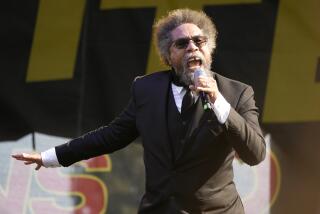Gore Hires Private Attorneys in Fund-Raising Probes
- Share via
STANFORD — His legal woes worsening, Vice President Al Gore has hired two private defense attorneys to handle investigations of questionable fund-raising in the 1996 election.
The hiring of Jim Neal of Nashville, Tenn., and George Frampton of Washington reflects growing concern that a special prosecutor might be named to study Gore’s fund-raising activities.
Lorraine Voles, a spokeswoman for Gore, confirmed the attorneys’ hiring in a telephone interview.
“The vice president wanted private counsel so he can get his position presented directly and personally to the Department of Justice,” Voles said. “He has instructed his private counsel to continue to cooperate fully with the department.”
Atty. Gen. Janet Reno has until the first week of October to complete an initial 30-day review about the possibility of conducting a formal investigation into whether an independent counsel should be appointed to look into Gore’s fund-raising.
If she approves the formal investigation, the Justice Department would have 90 days to decide whether to ask a federal court to appoint a special prosecutor.
The White House counsel’s office represents Gore only in his official capacity. It became clear in recent days that for the vice president to make his case to the Justice Department, he would need private counsel, said an official close to Gore.
The official, speaking on condition of anonymity, said Gore’s position will not change: He says he did no wrong.
There are no plans for Gore to launch a legal defense fund to pay his attorney fees, the official said.
Neal is a longtime friend and advisor of the Gores. He is a partner of the Neal and Harwell law firm.
Frampton, a former assistant secretary of interior under Clinton, will be co-counsel. He is based in Washington.
Gore says he broke no rules, but many Democrats are braced for the appointment of a special prosecutor to investigate further. Because special prosecutors have wide latitude in the scope of their investigations, such a probe could haunt Gore through the 2000 campaign.
An unfettered probe also could increase pressure on Clinton, who so far has weathered congressional investigations without serious harm to his popularity.
Gore acknowledged in March that he had made phone solicitations to 48 Democratic donors from his White House office between November 1995 and May 1996.
Federal law prohibits federal officials from making fund-raising solicitations on government property, although experts disagree whether that statute applies to calls made to donors outside the building.
Gore originally said he did not charge any of the calls to taxpayers, insisting he had used a Democratic Party credit card. But last month, the White House acknowledged 20 of his calls were originally charged to taxpayers.
Federal law prohibits the use of government resources for politics.
Gore and his supporters have steadfastly maintained that the calls he made from the White House were legal.
The Democratic National Committee recently reimbursed the Treasury $24.20 for calls in which Gore didn’t use a credit card. White House officials blamed staffers for the oversight.
As for the law prohibiting solicitations on federal property, Gore said he was advised before making the White House calls that there was nothing wrong with such solicitations. He said that after the controversy erupted, he also was told by his lawyers that there was “no controlling legal authority” to apply the law to his calls.
More to Read
Get the L.A. Times Politics newsletter
Deeply reported insights into legislation, politics and policy from Sacramento, Washington and beyond. In your inbox twice per week.
You may occasionally receive promotional content from the Los Angeles Times.










